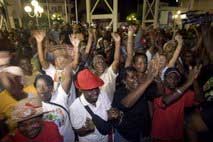 POINTE-A-PITRE, Guadeloupe (AFP) - Businesses began to reopen on Thursday in Guadeloupe after a general strike that had paralysed the French Caribbean island for 44 days ended with a promise of pay rises.
POINTE-A-PITRE, Guadeloupe (AFP) - Businesses began to reopen on Thursday in Guadeloupe after a general strike that had paralysed the French Caribbean island for 44 days ended with a promise of pay rises.
The end of the first major revolt in France since the start of the economic crisis was a relief for President Nicolas Sarkozy's government, which still faces a strike on neighbouring Martinique and tensions on the mainland.
"Today, our struggle has paid off," said Elie Domota, leader of the Liyannaj Kont Pwofitasyon (LKP - League Against Profiteering), which led Guadeloupe's mainly black majority against mainly white business leaders.
"We must remain mobilised and continue to fight," he declared late Wednesday to a crowd of supporters gathered outside the French state's headquarters on the island to see an agreement signed.
The six-week struggle, which saw one activist shot dead by protesters and hundreds of extra police deployed from mainland France, ended with a detailed 165-point deal on measures to improve living standards on the island.
While legally a full part of France and the European Union, Guadeloupe is one of the poorest corners of the national territory with 23 percent unemployment, more than twice the mainland rate, and a high cost of living.
The strikers accuse a ruling class of "Bekes", white descendants of colonial plantation owners, of exploiting monopoly positions in retail and construction in order to maintain high prices and a privileged lifestyle.
Private sector bosses deny profiteering, and have warned that the LKP's wage demands will simply push up unemployment in a region already heavily dependent on state subsidies and public sector jobs.
Under Wednesday's accord, Guadeloupe's workers will receive an extra 200 euros per month in their wage packets, partly paid for by the state and partly by their employers, to compensate for high prices.
"It's an important moment," said Nicolas Desforges, the prefect or state representative on the island. "We've come out on top with a 17-page document which represents an important programme.
"I think that tonight should give Guadeloupe a new start. We need to get back to work from tomorrow, pull out the stops, make up for lost time."
The employers' association MEDEF, which represents several of the islands largest businesses, has refused to sign the deal, but Domota insisted that most firms had agreed to finance their share of the increase.
The strike leader told Europe 1 radio that the accord would cover between 30,000 and 40,000 wage earners -- among a population of around 450,000 -- and that strikes would continue in any businesses that hold out.
Meanwhile, on the nearby island of Martinique, a similar strike entered its second month Thursday. Businesses remained closed and economic activity was paralysed by road blocks thrown up by protesters.
And 12,000 kilometres (7,500 miles) away on the French Indian Ocean island of Reunion, trade unions have called for another strike to start. In mainland France, labour leaders have called for a one-day stoppage on March 19.











